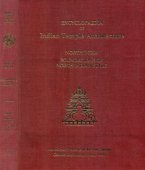Samutiri, Sāmūtiri: 1 definition
Introduction:
Samutiri means something in the history of ancient India. If you want to know the exact meaning, history, etymology or English translation of this term then check out the descriptions on this page. Add your comment or reference to a book if you want to contribute to this summary article.
India history and geography
Source: Yale Journal of Music & Religion: Ritual Music in Contemporary Brahmanical Tantric Temples of KeralaSāmūtiri is the name of an ancient ruler from Ēṛanāṭu.—In Kerala history, by the thirteenth century three rulers emerged as the most powerful: the Kōlatiri of Kōḷattunāṭu, the Sāmūtiri of Calicut (Ēṛanāṭu), and the Tiruvadi of Vēnāṭu. They worshipped fierce deities associated with warfare, such as Bhadrakālī, the Sapta Mātṛkas, Vēṭṭaykkorumakan, and Ayyappan; built new temples; and patronized priestly non-Brahmanical groups who maintained the ritual activities. Royal support facilitated the spread of the cults of these gods among warriors and other groups.

The history of India traces the identification of countries, villages, towns and other regions of India, as well as mythology, zoology, royal dynasties, rulers, tribes, local festivities and traditions and regional languages. Ancient India enjoyed religious freedom and encourages the path of Dharma, a concept common to Buddhism, Hinduism, and Jainism.
See also (Relevant definitions)
Full-text: Vettaykkorumakan, Ayyappan, Bhadrakali, Saptamatrika, Tiruvadi, Kolatiri, Tantrasamuccaya.
Relevant text
Search found 2 books and stories containing Samutiri, Sāmūtiri; (plurals include: Samutiris, Sāmūtiris). You can also click to the full overview containing English textual excerpts. Below are direct links for the most relevant articles:
Puranic encyclopaedia (by Vettam Mani)
Sanskrit sources of Kerala history (by Suma Parappattoli)
10. The Nilakanthasandesa by Sridharan Nambi < [Chapter 4 - Traces of Historical Facts from Sandesha Kavyas and Short poems]
6. The Bhrngasandesa by Vasudeva < [Chapter 4 - Traces of Historical Facts from Sandesha Kavyas and Short poems]
Ramavarman inscription (Thrippunithura, 1805 AD) < [Chapter 1 - Historical details from Sanskrit Inscriptions]
Related products
